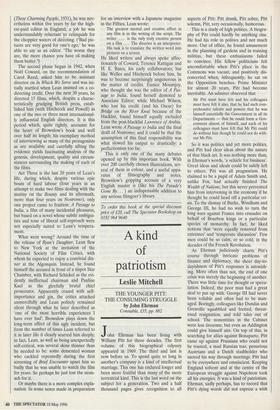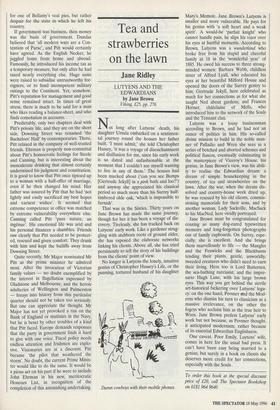A kind of patriotism
Leslie Mitchell
THE YOUNGER PITT: THE CONSUMING STRUGGLE by John Ehrman Constable, L35, pp. 882 John Ehrman has been living with William Pitt for three decades. The first volume of this biographical odyssey appeared in 1969. The third and last is now before us. To spend quite so long in another's company is a kind of intellectual marriage. This one has endured longer and been more fruitful than many of the more terrestrial kind. This is the last word on the subject for a generation. Two and a half thousand pages gives recognition to all aspects of Pitt: Pitt drunk, Pitt sober, Pitt solemn, Pitt, very occasionally, humorous.
This is a study of high politics. A biogra- phy of Pitt could hardly be anything else. He had his role in politics and not much more. Out of office, he found amusement in the planning of gardens and in training militias, but these enthusiasms failed to convince. His fellow politicians felt uncomfortable when Pitt's place in the Commons was vacant, and positively dis- concerted when, infrequently, he sat on the Opposition benches. Prime Minister for almost 20 years, Pitt had become inevitable. An admirer observed that
Mr Pitt must have felt and his colleagues must have felt it also, that he had such com- prehensive talents and powers that he was himself essentially the Government in all its Departments — that he could form a Gov- ernment almost of himself, and each of his colleagues must have felt that Mr Pitt could do without him though he could not do with- out Mr Pitt.
So it was politics and yet more politics, and Pitt had clear ideas about the nature of that black art. It was nothing more than, in Ehrman's words, 'a vehicle for business'. Great ideas and ideals could be safely left to others. Pitt was all pragmatism. He claimed to be a pupil of Adam Smith and, unlike Fox, had actually finished The Wealth of Nations, but this never prevented him from intervening in the economy if he thought he could head off a particular cri- sis. To the dismay of Burke, Windham and George III, he had no wish to turn the long wars against France into crusades on behalf of Bourbon kings or a particular species of monarchy. In fact, he liked notions that 'were equally removed from extremes' and 'temperate discussion'. Few men could be so calm, or so cold, in the decades of the French Revolution.
As Ehrman judiciously charts Pitt's course through intricate problems of finance and diplomacy, the sheer day-to- dayishness of Pitt's responses is astonish- ing. More often than not, the end of one crisis was merely the beginning of another. There was little time for thought or specu- lation. Indeed, the poor man had a great deal to put up with. George III had never been reliable and often had to be man- aged. Boringly, colleagues like Dundas and Grenville squabbled and fretted, threat- ened resignation, and told tales out of school. The nonentities in the Cabinet were less tiresome, but even an Addington could give himself airs. On top of this, in searching for allies against Bonaparte, Pitt came up against Prussians who could not be trusted, a mad Russian tsar, penurious Austrians and a Dutch stadtholder who snored his way through meetings. Pitt had to be everywhere and omniscient. Keeping England solvent and at the centre of the European struggle against Napoleon took all his energies. It was a kind of patriotism. Ehrman, sadly perhaps, has to record that Pitt's dying words did not express a wish for one of Bellamy's veal pies, but rather despair for the state in which he left his country.
If government was business, then money was the basis of government. Dundas believed that 'all modern wars are a Con- tention of Purse', and Pitt would certainly have agreed. As the English Necker, he juggled loans from home and abroad. Famously, he introduced his income tax as a temporary measure, but only after he had taxed nearly everything else. Huge sums were raised to subsidise untrustworthy for- eigners, or to fund incompetent military outings to the Continent. Yet, somehow, Pitt's reputation for management and good sense remained intact. In times of great stress, there is much to be said for a man who likes reading a balance-sheet, and who finds consolation in accounts.
Predictably, only two chapters deal with Pitt's private life, and they are on the short side. Downing Street was renamed 'the Bachelors' Hall' by contemporaries. There, Pitt relaxed in the company of well-trusted friends. Ehrman is properly non-committal about Pitt's homoerotic feelings for Steele and Canning, but is interesting about the immoderate drinking that almost certainly undermined his judgment and constitution. It is good to know that Pitt once tiptoed up to a woman with a half-offer of marriage, even if he then changed his mind. Her father was assured by Pitt that he had 'not lightly and easily sacrificed my best hopes and earnest wishes'. It seemed that extreme competence in office was matched by extreme vulnerability everywhere else. Canning called Pitt 'pure nature, an ingenue'. His emotional life was arid and his personal finances a shambles. Friends saw clearly that Pitt needed to be protect- ed, rescued and given comfort. They drank with him and kept the bailiffs away from Downing Street.
Quite recently, Mr Major nominated Mr Pitt as the prime minister he admired most. After the invocation of Victorian family values — no doubt exemplified by the interest in flagellation expressed by Gladstone and Melbourne, and the heroic adulteries of Wellington and Palmerston — forays into history from this particular quarter should not be taken too seriously. But one can appreciate the thought. Mr Major has not yet provoked a run on the Bank of England or mutinies in the Navy, but he is beset by other troubles of a kind that Pitt faced. Europe demands responses that the party in government finds it hard to give with one voice. Fiscal policy needs endless attention and Irishmen are explo- sive. Visionaries are at a discount. Pitt became 'the pilot that weathered the storm'. No doubt, the current Prime Minis- ter would like to do the same. It would be a pious act on his part if he were to include John. Ehrman in his new, meritocratic Honours List, in recognition of the completion of this astonishing undertaking.



































































 Previous page
Previous page